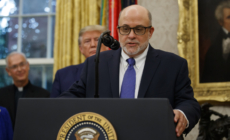-
Mark Levin Calls for Regime Change in Iran as MAGA Israel Fissure Grows - 17 mins ago
-
Can Labubu, This Ugly Elf, Make China Cool? - 42 mins ago
-
Dodgers Star Pitcher Speaks Out on Rival Giants Acquiring Rafael Devers - 52 mins ago
-
Spectrum says would-be copper thieves behind widespread outage - about 1 hour ago
-
Minnesota Shootings Suspect Had a List of 70 Potential Targets - about 1 hour ago
-
Alleged Minnesota Assassin Vance Boelter in Custody-Report - about 1 hour ago
-
Aaron Rodgers Fit With Steelers Called Into Question by NFL Legend - 2 hours ago
-
‘I’m an American, Bro!’: Latinos Report Raids in Which U.S. Citizenship Is Questioned - 2 hours ago
-
Why JJ Spaun was at CVS at 3AM the Morning of U.S. Open Victory - 3 hours ago
-
At Least 5 Dead in West Virginia Flash Flooding - 3 hours ago
Target Boycott: Figures Show Impact of ‘Blackout’ Protest
Target saw declines in its online and in-store traffic during a nationwide economic “blackout” that the People’s Union USA, a grassroots group, organized on February 28, according to data shared by Forbes.
Newsweek contacted Target and the People’s Union USA for comment by email on Wednesday outside standard working hours.
Why It Matters
Upon returning to the White House, President Donald Trump signed an executive order calling for the end of diversity, equity and inclusion programs across the federal government, describing such initiatives as “dangerous, demeaning, and immoral” and alleging that they promote discrimination. Amid the Trump administration’s pushback against DEI initiatives, companies such as Meta, McDonald’s, Amazon and Target announced rollbacks of their DEI programs.
In January, Target cited an “evolving external landscape” when announcing the end of its DEI goals. While members of the MAGA movement have celebrated the end of such initiatives as victories against “wokeness,” many Americans have criticized these corporate decisions.

Justin Sullivan/Getty Images
What To Know
During the economic blackout on Friday, Target experienced an 11 percent drop in customer traffic in its stores and a 9 percent decline in traffic on its website, Forbes reported.
In its fourth-quarter and full-year 2024 earnings report, released on Tuesday, the company also warned that its top-line performance in February was “soft.” However, it did not mention the economic blackout, and any connection with the consumer boycotts remains unclear.
The retailer’s net sales saw “a small decline” in February, the report said, and Target now expects to see “meaningful year-over-year profit pressure in its first quarter relative to the remainder of the year” in light of ongoing consumer and tariff uncertainty, as well as “the expected timing of certain costs within the fiscal year.”
Target’s full-year revenues declined by 0.8 percent last year, sliding from $107.4 billion in 2023 to $106.6 billion in 2024.
What People Are Saying
Jim Lee, Target’s chief financial officer, said in the earnings report: “During February, we saw record performance around Valentine’s Day. However, our topline performance for the month was soft, as uncharacteristically cold weather across the U.S. affected apparel sales, and declining consumer confidence impacted our discretionary assortment overall.
“Looking ahead, we expect to see a moderation in this trend as apparel sales respond to warmer weather around the country, and consumers turn to Target for upcoming seasonal moments such as the Easter holiday. We will continue to monitor these trends and will remain appropriately cautious with our expectations for the year ahead.”
John Schwarz, who founded the People’s Union USA, said in a video promoting the February 28 boycott: “For decades, they have told us that we are powerless, that we have no control, and that this system is too big, too strong, too unshakable. We are going to remind them who has the power. For one day, we turn it off. For one day, we shut it down. For one day, we remind them that this country does not belong to the elite, it belongs to the people, and this will work.”
Brayden King, a professor of management and organizations at Northwestern University’s Kellogg School of Management, told USA Today: “Saying you’re going to boycott something does feel like you’re casting a vote that you hope makes a difference down the road.”
He added: “[Groups put] a negative spotlight on the companies they’re boycotting, and that could in the long run have reputational consequences. What boycotts don’t seem to do is have much of an impact on consumer behavior.”
What Happens Next
Target is expected to see more grassroots consumer boycotts in the coming months, with the People Union’s USA singling out the retailer for a boycott between June 3 and June 9.
Jamal Bryant, a pastor in Atlanta, has also called for “a 40-day economic fast against Target over the retailer’s cutback on DEI” that would essentially coincide with Lent. More than 50,000 have signed the online pledge, CNN reported.
Such actions may have significant effects on the company’s reputation, if not its profits.
Source link




















